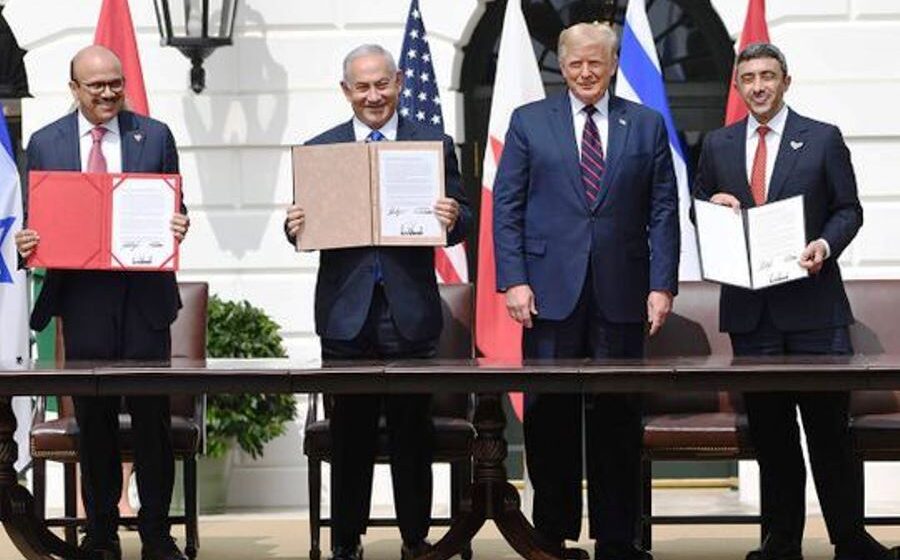In what could alter the political landscape of the Middle East, the UAE and Bahrain on Tuesday signed the historic Abraham Accords to normalise relations with Israel.
US President Donald Trump presided over the signing ceremony held at the sprawling White House South Lawn at around 9pm UAE time, with flags of all the four countries in the background.
Israeli Prime Minister Benjamin Netanyahu shared the table with Sheikh Abdullah bin Zayed Al Nahyan, UAE Minister of Foreign Affairs and International Cooperation, and Bahrain Foreign Minister Abdullatif Al Zayani with Trump seated next to Sheikh Abdullah.
“I stand here today to extend a hand of peace and receive a hand of peace,” Sheikh Abdullah said while speaking from the White House Podium minutes before signing the accord.
Sheikh Abdullah thanked Netanyahu “for halting the annexation of the Palestinian territories”, a decision he said reinforces “our shared will to achieve a better future for generations to come”.
The three countries signed three documents – the Abraham Accord, the Declaration of Peace and the Treaty of Peace, Diplomatic Relations and Full Normalisation – in Arabic, Hebrew and English.
Trump, the architect of the new political order between Arabs and Jews, hailed the event as a “historic day for peace in the Middle East and an incredible day for the world”.
“We are here this afternoon to change the course of history,” he said.
Earlier, speaking to the media, Trump said “five or six’ other Arab nations will join the now-widening circle of peace and establish normal relations with Israel.
He said Palestinians will also come around and establish peace with Israel.
“And you are going to have peace in the Middle East without being stupid and shooting everybody, and killing everybody, and having blood all over the sand,” Trump said speaking to Fox News hours before the ceremony.
The UAE is the first Gulf nation to normalise relations with Israel, and within weeks, Bahrain announced that they are following the UAE lead, becoming the fourth Arab country after Egypt and Jordan to forge ties with Israel.
Alluding to personal losses he and family have endured due to wars, Netanyahu said the accords can “ultimately end the Arab-Israeli conflict once and for all”.
“For those who are with us today, and those who will join us tomorrow.I say ‘Assalamu Alaykum! Shalom!”
Calling it a moment of hope and prosperity for the people of the Middle East, the Bahrain foreign minister reminded the elite audience that a “two-state solution is the bedrock for lasting peace” in the region.
The throwback to history could not be lost as the signing ceremony was held on the South Lawn where in September, 1978 the then US president Jimmy Carter oversaw the Camp David Accord between Egyptian President Anwar Sadat and Israeli Prime Minister Menachem Begin.
Sheikh Abdullah, in his speech delivered in Arabic, said that the accords builds upon previous peace agreements signed by Arab nations with the State of Israel.
“The aim of all of these treaties is to work towards stability and sustainable development.”
He said the UAE believes the role of the United States in the Middle East is positive.
“And, as for us in the United Arab Emirates, this accords will enable us to continue to stand by the Palestinian people, and realise their hopes for an independent state within a stable and prosperous region.”
“Peace requires courage and shaping the future requires knowledge. The advancement of nations requires sincerity. We came to tell the world this is our approach; peace is our guiding principle.”
The deal will see both the UAE and Bahrain establish embassies and have ambassadors, and sign bilateral agreements on investment, tourism, direct flights, security, telecommunications, technology, energy, healthcare, culture, the environment and other areas of mutual benefit.
The peace accord halts the imminent threat of annexation of Palestinian territories on the West Bank, which the UAE considers will give Palestinians a window to negotiate peace.




Leave a Reply